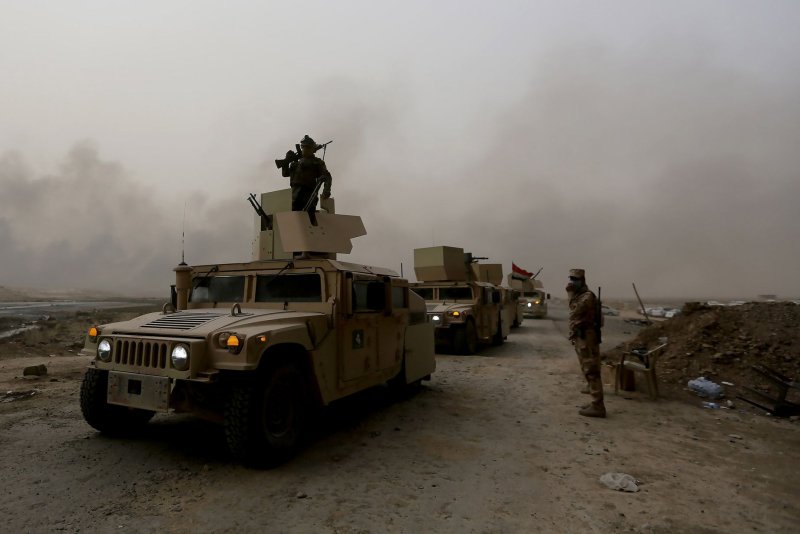Iraqi army fighters look on as smoke rises in the background from burning oil fields damaged during fighting between Iraqi forces and Islamic state fighters in Qayara town, south of Mosul, northern Iraq, November 1, 2016. File Photo by Murat Bay/UPI |
License Photo
Thousands of Iraqi civilians have disappeared while fleeing battles in Anbar province and Mosul. Their families are in agony, uncertain whether their loved ones are alive.
Jamila al-Obeidi, a member of the Iraqi parliament, called on the U.S.-led international coalition supporting Iraqi forces against the Islamic State (ISIS) to help determine the fate of the disappeared, including 500 documented missing people from her province of Nineveh, which includes Mosul.
"The government has turned a deaf ear to our quest. They form so-called investigation committees that yield no result. That is why we appeal to the coalition forces to help us deal with this thorny file," Obeidi said.
"Months have passed since tens of our finest young men have gone missing or were imprisoned in ambiguous circumstances and we are incapable of having any news about them."
Human rights groups have accused the Popular Mobilisation Forces (PMF) of committing violations against unarmed civilians. The abductions happened during military operations to retake mainly Sunni areas.
An Iraqi activist who asked to be identified only by his first name, Ahmad, said he feared the fate of the missing in Mosul is like that of the disappeared in Anbar province.
"Some 250 civilians have been kidnapped at the end of April in Al- Hadar, south of Mosul. They were taken while trying to reach the refugee camps of Hammam Al-Alil and Tal Abta, an area that was controlled by the [PMF] after ISIS militants were evicted," Ahmad said.
"Most surprising was the government and security forces' position. They had no information whatsoever about the missing or the area from where they were kidnapped."
Zohair Hazem al-Jabouri, spokesman for Nineveh Guards militia, was more categorical: "The area where the kidnappings occurred falls under the direct responsibility of the parties loyal to Iran," he said. "The aim of such acts is not merely to apprehend suspected collaborators with ISIS but to settle accounts with the people in the (Sunni-dominated) region."
At least 643 men and boys from Saqlawiya in Anbar governorate are missing more than a year after they were reportedly abducted by Shia militias.
The Iraqi Observatory for Human Rights said as many as 3,000 civilians had been forcibly disappeared in Anbar since the beginning of military operations to uproot ISIS in 2015. Among them, 902 went missing in the district of Razaza, south of Falluja, in addition to those taken in Saqlawiya.
Many families refused to return to "liberated" towns before the fate of their missing relatives is revealed.
Oum Ahmad, a housewife, who lives in a refugee camp near Ramadi, said she was not budging. Her husband and eldest son were kidnapped during their displacement from Saqlawiya.
"We cannot return without our men. It is unacceptable," she said. "Most women refuse to go home because they fear they would be harassed by the forces that control the place now.
"The people of Saqlawiya have suffered a lot at the hands of ISIS militants and now we are accused of collaborating with the terrorists."
Anbar Governor Sahib al-Rawi has said that a commission tasked with investigating alleged violations against civilians during the battle to retake Falluja has gathered evidence that implicated PMF members in the killing of 49 people and the kidnapping of 643 others from Saqlawiya.
Rajeh Barakat, a member of the Anbar provincial council, said the number of the disappeared cannot be established as many families were reluctant to report their missing relatives out of fear for their safety.
"We all know that the PMF have control over certain parts of Anbar. The disappearance of thousands of people, including government employees, in mysterious conditions cannot be disregarded," Barakat stated.
Amnesty International has repeatedly called on Iraqi authorities to reveal the fate of those who had been forcibly disappeared by the PMF and Iraqi security forces and to ensure investigations were thorough, impartial and independent.
Masrour Aswad, former member of the High Commission of Human Rights in Iraq, underlined the complexity of the issue of the missing.
"It is one of the most controversial issues, especially that the government is not serious about revealing the fate of some 5,000 people missing in the provinces previously controlled by ISIS," he said.
"The violations in Mosul could be worse. The lack of law enforcement during the arrest of suspects led to the disappearance of hundreds of innocent people in mysterious circumstances."
This article originally appeared at The Arab Weekly.















